|
|
|
Sort Order |
|
|
|
Items / Page
|
|
|
|
|
|
|
| Srl | Item |
| 1 |
ID:
152374


|
|
|
|
|
| Publication |
DelhI, Cambridge University Press, 2016.
|
| Description |
x, 326p.pbk
|
| Standard Number |
9781316633946
|
|
|
|
|
|
|
|
|
|
|
|
Copies: C:1/I:0,R:0,Q:0
Circulation
| Accession# | Call# | Current Location | Status | Policy | Location |
| 059006 | 327.09172/PAU 059006 | Main | On Shelf | General | |
|
|
|
|
| 2 |
ID:
151384
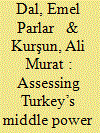

|
|
|
|
|
| Summary/Abstract |
This study attempts to identify possible new roles for intermediary actors in the changing global architecture by focusing on Turkey’s middle power capacity in the nascent middle power network of Mexico, Indonesia, South Korea, Turkey, Australia (MIKTA). It looks at an overarching embedded analytical triad of goals, means, and impact, superimposed over positional, behavioural, and ideational sublayers. It tests the assumption that the more a state holds together its middle power goals, means, and impact in a combined way, the more leverage it can have as a middle power in the changing international political economy. After reviewing the existing literature on middle powers, the first part of this paper outlines this embedded analytical framework. The second and the third parts seek to operationalize this framework, in particular at institutional and state levels in the example of MIKTA and Turkey. The fourth part delves into the opportunities and challenges that Turkey faces in its MIKTA trajectory (in the light of the conclusions drawn from the second and third parts). The study concludes that while Turkey possesses fairly compatible goals and impact with those of MIKTA, it is still far from channelling all of its capabilities to this new network due mainly to the domestic and regional impediments it faces—as well as the lack of a comprehensive roadmap in relation to MIKTA.
|
|
|
|
|
|
|
|
|
|
|
|
|
|
|
|
| 3 |
ID:
130170


|
|
|
|
|
| Publication |
2014.
|
| Summary/Abstract |
Asia's middle powers face a trilateral dilemma stemming from their relationships with the U.S. and China. This paper uses the Australian example to examine the dilemma. It shows that Australia has bound itself to the U.S. because of domestic political factors, cost considerations, a belief that it can keep its interests separate, and its perception of regional threats. The paper then argues that others are likely to resolve their trilateral dilemmas in ways that make the regional strategic dynamic more competitive.
|
|
|
|
|
|
|
|
|
|
|
|
|
|
|
|
| 4 |
ID:
161611
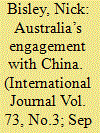

|
|
|
|
|
| Summary/Abstract |
This paper examines how Australia has managed its relationship with China. It looks at the broad trends in the relationship, with a focus on the decades after recognition in 1972. The second part examines the recent past, and particularly the ways in which Australia’s active courtship of China has begun to be tempered by concerns about the destabilizing security and strategic consequences of the country’s return to power. It assesses the options Australia faces and the growing polarization of opinion between security “hawks” and economic “doves” in public debate about Australia’s future, and then charts where Australian policy is currently placed. The paper concludes by explaining why Australia finds taking a nuanced position in relation to its engagement with China so difficult.
|
|
|
|
|
|
|
|
|
|
|
|
|
|
|
|
| 5 |
ID:
163125
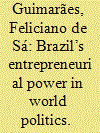

|
|
|
|
|
| Summary/Abstract |
In this paper, we apply the concept of entrepreneurial powers to analyze Brazil’s participation and influence in international crises. Following Ravenhill (this journal issue), we consider three dimensions of entrepreneurship: (a) the intention to convince others according to an actor’s interests; (b) the use of skilful politicians and bureaucracies to persuade partners; and (c) a proactive foreign policy that “sells” its position regarding the issues at stake. We argue that two other factors should be considered for a more encompassing view of entrepreneurial powers. First, the position of the involved great power on the crisis or in its negotiation. Second, that regional politics matter to entrepreneurial powers. We develop our argument using two case studies of success and failure respectively: the 1995 Cenepa War between Peru and Ecuador mediated by Brazil, and the 2010 Iranian nuclear deal sponsored by Brazil and Turkey.
|
|
|
|
|
|
|
|
|
|
|
|
|
|
|
|
| 6 |
ID:
107232
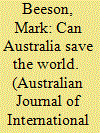

|
|
|
|
|
| Publication |
2011.
|
| Summary/Abstract |
Australian policymakers have always harboured a desire to 'punch above their weight'. On occasions they have succeeded. At a time when Australia's strategic, economic and environmental future is inextricably bound up with that of its immediate neighbours and the wider world, there are compelling reasons for hoping that they still can. This paper explores some of the most important aspects of Australian foreign policy during the Rudd era and asks whether the Australian government can play a constructive-even an exemplary-role in finding solutions for some of the planet's most pressing problems.
|
|
|
|
|
|
|
|
|
|
|
|
|
|
|
|
| 7 |
ID:
137302
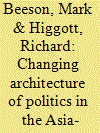

|
|
|
|
|
| Summary/Abstract |
Middle power theory is enjoying a modest renaissance. For all its possible limitations, middle power theory offers a potentially useful framework for thinking about the behavior of, and options open, to key states in the Asia-Pacific such as South Korea, Japan and Australia, states that are secondary rather than primary players. We argue that middle powers have the potential to successfully implement ‘games of skill’, especially at moments of international transition. Frequently, however, middle powers choose not to exercise their potential influence because of extant alliance commitments and the priority accorded to security questions. We substantiate these claims through an examination of the Australian case. Australian policymakers have made much of the potential role middle powers might play, but they have frequently failed to develop an independent foreign policy position because of pre-existing alliance commitments. We suggest that if the ‘middle power moment’ is to amount to more than rhetoric, opportunities must be acted upon.
|
|
|
|
|
|
|
|
|
|
|
|
|
|
|
|
| 8 |
ID:
151386
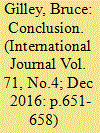

|
|
|
|
|
| Summary/Abstract |
The challenges for middle powers relate directly to their unstable positional status in the international system. Yet this unique position in the international Goldilocks Zone of having not too much power but power enough also gives them unique opportunities. Successful middle powers recognize their middle power status and then formulate a strategic diplomacy suited to this status in which they accept the centrality of great power interests and roles. Too many middle powers fail to do this because they entertain delusions of grandeur, and when those delusions are revealed they fall into isolation or disengagement from global governance.
|
|
|
|
|
|
|
|
|
|
|
|
|
|
|
|
| 9 |
ID:
167223
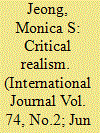

|
|
|
|
|
| Summary/Abstract |
The fundamental problem in middle power scholarship lies in the research design that inadvertently permits bias, tautology, and circularity in the process of realizing the final outcome. Most researchers begin with a presumption that middle powers are countries in the middle range of the world order, capable and willing to play some constructive roles beyond their borders. Thus, they tend to select methods and data compatible with the given presumption, and reach predictable outcomes that determine middle power status by middle power behaviours, or middle power behaviours by middle power status. This is an epistemic fallacy where the ontic category of middle powers is defined by the epistemic knowledge of middle powers. Eventually, any countries with comparable characteristics/behaviours to the given presumption can be classified as “middle powers” conducting middle power behaviours. This article offers critical realism as a much-needed remedy to the stagnant middle power scholarship. It examines a group of countries already categorized as middle powers—Mexico, Indonesia, South Korea, Turkey, and Australia (MIKTA)—under a critical realist framework, and finds that those countries and their activities cannot be generalized by the conventional middle power conception. In fact, the middle power rhetoric itself holds both a positive and negative ideological implication that requires further scrutiny. Yet, what makes the critical realist research design and its findings invaluable is the commitment to ontological realism, epistemological relativism, and judgmental rationalism that addresses the recurring epistemic fallacy. Therefore, the research findings are not merely new insights about “middle power” countries; they are a valid clue that can help uncover the “real” world that causes the so-called “middle power” categorization.
|
|
|
|
|
|
|
|
|
|
|
|
|
|
|
|
| 10 |
ID:
164366
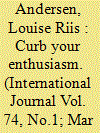

|
|
|
|
|
| Summary/Abstract |
The future looks post-Western. But will it also be post-liberal? To gauge how and by whom liberal internationalism may be sustained in the coming order, the article provides a critical and historically grounded analysis of the role of the United Nations in the fading US-led order and the ordering potential and role of middle powers. The article suggests that in the current interregnum of global governance the conventional distinction between traditional and emerging middle powers is increasingly unhelpful. What matters is not their past history, but their present proclivity for seeking multilateral, negotiated solutions. It is this pragmatic version of liberal internationalism that may have a future in a post-Western world, and open up a more pluralist, inclusive approach to global governance.
|
|
|
|
|
|
|
|
|
|
|
|
|
|
|
|
| 11 |
ID:
143920
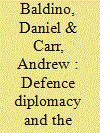

|
|
|
|
|
| Summary/Abstract |
The practice of military-to-military engagement has been strongly embraced in the last few decades as a central tool for strategic management. Many governments in the Asia-Pacific, including Australia, have accepted the practice as an instrument of statecraft to achieve comprehensive strategic outcomes: as a means of defusing tensions, reducing hostility and shaping the behaviour of states towards each other. This article examines Australia's broad approach and practice, and argues that such transformative ambitions are overstated. The evidence suggests that the benefits from defence diplomacy are evident at the tactical and operational level. It is a mode to deal with precise and immediate security issues, as opposed to the moulding of major strategic settings. This indicates the need to better recognise the limitations and conceptual flaws of defence diplomacy, and to reformulate Australian defence channels and related engagement prescriptions towards a more cautious, pragmatic and ultimately security-related stance. Through the use of case-study analysis, this research identifies both opportunities and constraints in conducting defence diplomacy, while offering guidelines for its future implementation in the region.
|
|
|
|
|
|
|
|
|
|
|
|
|
|
|
|
| 12 |
ID:
175678
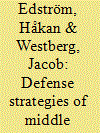

|
|
|
|
|
| Summary/Abstract |
Do middle powers develop similar defense strategies? Is middle powers a useful category for exploring the diversity of strategies among different categories of states? This article presents a great variation of strategies among the selected cases. Concurrently, similarities between middle powers belonging to similar regional security complexes (RSC) are revealed. The higher degree of great power penetration into a RSC, the lesser options for middle powers to develop individual strategies and vice versa. Furthermore, by comparing our findings with the strategies of more and less resourceful states, common elements among middle powers in terms of ends, means and ways, appear.
|
|
|
|
|
|
|
|
|
|
|
|
|
|
|
|
| 13 |
ID:
186780
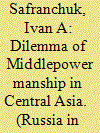

|
|
|
|
|
| Summary/Abstract |
This article examines the shift in the balance of power in Central Asia in
the context of the United States’ declining global hegemonic power. The
authors analyze the hegemonic struggle between China, Russia, and the
U.S. in Central Asia and its influence on the middle power formation in this
region. The authors argue that although Kazakhstan and Uzbekistan have
high economic potentials, by certain criteria they have not achieved the
status of middle powers yet. “Middlepowermanship dilemma” is formulated
to explain why a hegemonic order has not been established in Central Asia
and why middle powers have not emerged in the region.
|
|
|
|
|
|
|
|
|
|
|
|
|
|
|
|
| 14 |
ID:
163124
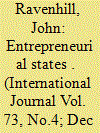

|
|
|
|
|
| Summary/Abstract |
The emergence of newly prominent participants (NPPs) in global governance has led to a revival of scholarly interest in the concept of middle powers. Because NPPs do not share the characteristics of “classical” middle powers, analysts have attempted to salvage the concept by adding various qualifiers. In doing so, they have further reduced its analytical utility. The concept of “entrepreneurial” states extracts the valuable components of the literature on middle powers while avoiding the problems arising from the conflation of two elements of behaviour—strategic and purposive. Entrepreneurial states are countries that seek to gain the support of others in pursuit of their perceived interests in the international system. They may be supporters of the current system, or seek to change it fundamentally. We investigate what attributes are necessary for states to behave in an entrepreneurial manner through studies of both successful and failed attempts at policy entrepreneurship.
|
|
|
|
|
|
|
|
|
|
|
|
|
|
|
|
| 15 |
ID:
163129
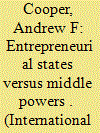

|
|
|
|
|
| Summary/Abstract |
This article highlights both the differences and similarities between the concepts of entrepreneurial states and middle powers. The use of the entrepreneurial state as the central framing device is distinctive in a number of ways, including reducing the emphasis on hierarchy in the global system. Yet for all the divergences, the two frames are indelibly intertwined, above all in privileging agency over structural positioning. In either case there is an element of constant flux and reinvention, which justifies ongoing research. Just when the elevation of the G20 and the appearance of MIKTA appeared to provide some discipline to the image of a middle power, the notion of entrepreneurial states stretches the number of countries to be included. At the same time, however, attributes that reflect some middle power sensibility are embedded within the entrepreneurial state set of practices.
|
|
|
|
|
|
|
|
|
|
|
|
|
|
|
|
| 16 |
ID:
164367
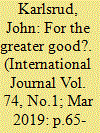

|
|
|
|
|
| Summary/Abstract |
The usual suspects of middle power internationalism—small and middle powers such as Canada, Denmark, Norway, the Netherlands, and Sweden—have all contributed to the UN peacekeeping mission in Mali (MINUSMA). This article argues that while these and other Western countries' contributions to MINUSMA may still be characterized as investments into UN peacekeeping reform and a rule-governed world order, the liberal underpinnings of that commitment are withering. Instead, these countries seek to enhance their own status. This is done by gaining appreciation for their contributions, primarily from the US; strengthening their bids for a non-permanent seat on the UN Security Council; and self-interested contributions to reform UN peacekeeping by efforts to enable it to confront violent extremism and terrorism. Paradoxically, the article concludes, when moving the UN towards counterterrorism and weakening the legitimacy of the organization, Western states undermine a cornerstone of their own security.
|
|
|
|
|
|
|
|
|
|
|
|
|
|
|
|
| 17 |
ID:
192079
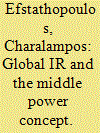

|
|
|
|
|
| Summary/Abstract |
The premise of Global IR for greater pluralism and inclusivity allows for reconsidering the relevance of established concepts in the IR discipline. This article discusses how Global IR can contribute to rethinking the question of agency in the middle power concept. While the concept has been used in a Western and non-Western context, there is a tendency to adopt a binary distinction between Western middle powers that are conformist in their approach to the liberal international order and Southern middle powers that adopt a reformist stance. The article argues that a Global IR approach can help overcome this dichotomy and open up the study of Western and Southern middle powers to new agential possibilities. To demonstrate this, the article discusses how the cases of Australia and Brazil are not limited to conformist and reformist middle power agencies respectively. The discussion shows how the two states have undergone periods of ambivalence to gradually project new forms of middle power agency that alter and redefine their roles within the liberal international order.
|
|
|
|
|
|
|
|
|
|
|
|
|
|
|
|
| 18 |
ID:
087335
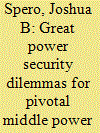

|
|
|
|
|
| Publication |
2009.
|
| Summary/Abstract |
By theoretically and empirically examining regional middle power influence, this article explores how particular middle powers emerge pivotally to affect great powers. Clearly, middle powers like Poland and South Korea cannot act effectively alone. But they are at the centre of greater power disputes and must insulate themselves from great power alignments to preserve independence and prosperity. Even with their frequent predicaments, such as limited resources and modest power capabilities, middle powers can influence great power security dilemmas, and even can reduce those dilemmas through regional and cooperative bridging alignments.
|
|
|
|
|
|
|
|
|
|
|
|
|
|
|
|
| 19 |
ID:
164368
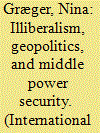

|
|
|
|
|
| Summary/Abstract |
Middle powers have played a key role in supporting global governance, a rules-based order, and human rights norms. Apart from conveying and effectuating global solidarity and responsibility, multilateral cooperation has been an arena where middle powers seek protection and leverage relatively modest power to greater effect, sometimes as “helpful fixers” to great powers. This article argues that geopolitical revival and the contestation of the liberal order are challenging middle powers' traditional sheltering policies, based on empirical evidence from the Norwegian case. First, the weakening of multilateral organizations is making middle powers more vulnerable to great power rivalry and geopolitics, and Norway's relationship with Russia is particularly pointed. Second, existing shelters such as NATO and bilateral cooperation with the US are negatively affected by the latter's anti-liberal foreign policies, making looser sheltering frameworks important supplements. While Norway's and other middle powers' traditional policies within the “soft power” belt may continue, “doing good” may become less prioritized, due to the need for security.
|
|
|
|
|
|
|
|
|
|
|
|
|
|
|
|
| 20 |
ID:
128617
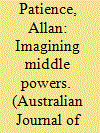

|
|
|
|
|
| Publication |
2014.
|
| Summary/Abstract |
Discussions of middle powers in international relations scholarship are hampered by a lack of clarity about what the term 'middle power' actually means. This has not stopped increasing numbers of states that cannot claim great power ranking but resist being categorised as small powers imagining middle power status for themselves in regional and global affairs. In an attempt to shed light on middle power imagining, three concepts of middle power are identified. It is contended that one or more of these concepts influences the foreign policies of states ambitious for middle power recognition in regional and global affairs. Identifying which concept, or which combination of concepts, influences a state's middle power imagining may contribute to deeper understandings of the effectiveness, or otherwise, of its foreign policies.
|
|
|
|
|
|
|
|
|
|
|
|
|
|
|
|
|
|
|
|
|